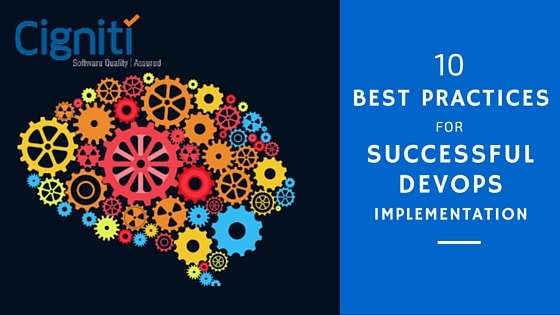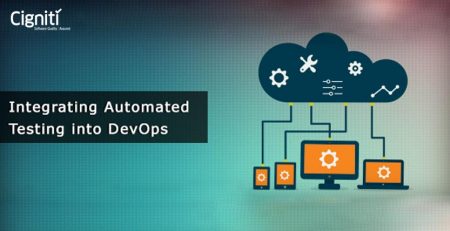Top 10 Open Source Tools for Testing DevOps
DevOps is a process – a mind-set – that requires a cultural shift in the way most organizations work today. Implementing DevOps as part of the culture is helping organizations to create teams of developers, operation experts, and QA and testers that collaborate better than ever before. DevOps also helps simplify and streamline the existing processes and workflows between groups.
DevOps is not just another tool-in-the-box. That said, because DevOps is built on top of Agile and follows a similar software testing lifecycle (STLC), all the tools relevant for STLC can also be used for proper implementation and functioning of DevOps.
There are a lot of open source tools and testing frameworks available for DevOps that help organizations in the proper implementation of DevOps strategies. These frameworks assist organizations with their configuration, integration, and delivery management needs and help sharing of information within teams, automating processes, save time, and establish a regime of continuous activities – continuous testing included.
Here are 10 Open Source DevOps tools (- in alphabetical order) that are helping organizations succeed in today’s cut throat competitive world.
|
Logo |
Tool and Description |
 |
APPIUM, a freely distributed open source mobile application UI testing framework, allows hybrid, native, and web app testing. It also supports automation test on physical devices, emulators, and simulators. A big advantage that Appium offers is cross-platform app testing by using the single API for both Android and iOS platform test scripts. Because Appium uses vendor-provided automation frameworks, there is no need to additionally compile any Appium or third-party code/frameworks as you are testing the app that is being shipped. |
 |
Bamboo is a continuous integration server from Atlassian, the makers of JIRA, Confluence and Crowd. Bamboo ties automated builds, tests, and releases in a single workflow. This helps in implementing continuous integration, deployment, and delivery. Bamboo can help run tests in parallel batches as it supports up to 100 remote build agents. This helps to keep the queue flowing, and to provide quick feedback to developers. |
 |
CruiseControl is a Java-based framework that helps implement a continuous build process and allows performing continuous integration of software development process. CruiseControl.NET however comprises of two executable components: ccservice.exe (the windows service) and ccnet.exe (a console app included for testing purposes). As it is easier to debug a console application rather than a service, it is recommended to perform initial tests with ccnet.exe and the to read the console output to understand CCNet exceptions and behavior. |
 |
Behavior Driven Development (BDD) is a practice that tests systems rather than testing code. Cucumber is a Ruby based test tool for the BDD framework and is used to write (and run) automated acceptance tests in simple, plain English that can be understood by Business Analysts, Developers, Testers, etc. |
 |
While Git is a version control system, GitHub is a staging platform that lets developers edit and build upon each other’s code, share prototypes, and collaborate on projects. By sending a link to a GitHub project, clients can test-drive the web sites in progress for functionality. TestRail, a web-based test case management software, when integrated with GitHub can help developers, testers, and team leads to centrally manage and coordinate software testing efforts. |
 |
Jenkins, an extensible automation server, is a continuous integration (CI) (that involves automatic creation and testing) and continuous delivery (CD) application that can distribute build/test loads to multiple computers with different OSs. This speeds up the integration process and the users can get a fresh build as required. Jenkins also helps in CD of applications by guiding the definition of build pipelines and integrating with a large number of technologies related to testing and deployment. Jenkins can be used as a simple CI server, to build and test Android apps, to support the Git version control system, and to provide unit testing for other technologies using a host of plugins. |
 |
JUnit is a simple Unit/Regression Testing Framework used by Java developers to write repeatable tests that increase programming speed and improve the quality of code. JUnit test framework can be easily integrated with Eclipse, Ant, or Maven, and provides features such as Fixtures, Test suites, JUnit classes, and Test runners. JUnit has played a critical role in the development of test-driven development, and belongs to the family of unit testing frameworks collectively called xUnit (originated with SUnit). |
 |
Maven is a tool used for automating build lifecycles using Java, C#, Ruby, Scala, and other languages. Automation ensures that for building a project, only a small set of commands need to be executed. Maven uses an XML file to explain the software project that is being built, along with its dependencies on required plug-ins, external modules and components, etc. The Apache Software Foundation hosts the Maven project. |
 |
Selenium Automation Framework (SAF) is a customized, open source, portable software testing framework for web applications that has been developed using Selenium. By using a script-less test automation framework, SAF reduces coding efforts, test cycle times, and related costs, which improves the test automation efficiency of apps developed on .Net, AJAX, or Java/J2EE. Selenium was developed by a team of programmers and testers at ThoughtWorks. It was released under the Apache 2.0 license and can be downloaded and used without charge. Selenium IDE is a full-fledged integrated development environment for authoring tests using a test domain-specific language (Selenese) to write tests in a number of popular programming languages, including Java, C#, Groovy, Perl, PHP, Python and Ruby. It also is a record/playback tool for authoring tests. |
 |
TestNG is a testing framework that has been designed to cover multiple test categories such as end-to-end, functional, integration, unit, etc. Taking inspiration from JUnit and NUnit, TestNG has been built to provide some additional, advanced new functionalities to the testing framework. These advanced functionalities provide a lot of benefits to both developers and testers. To be used properly, TestNG requires JDK 5 or higher installed. |
With a plethora of open source (and commercial) tools available, implementing and integrating the most suited tool for your DevOps needs can prove to be a daunting task. However, done with the right partner, you can end up saving a lot of time and money, while increasing quality and time to market. Cigniti Technologies helps you realize the gains that DevOps can bring with a proper automated testing framework in place. Click here to know more about Cigniti’s DevOps expertise.





Comments (3)
Hi ,Thank you for providing such an informative information. I am into app development for last 10 years now and understand the necessity of testing your apps thoroughly before putting it for user user .I wanted to check how my app was running on all real-time devices.Then I Came across pCloudy which have all real-time devices to check all apps and they provided free trial also.their mobile app performance testing tools helped me understand my app performance and fix my errors.
Thank you for such detailed list, but I also would like to suggest one more great opensource tool which could perfectly fit into this list, named EasyQA. I`ve been using it for a while. EasyQA seemed like good and quite interesting QA system with a really decent functionality and tremendously smooth UX. BTW EasyQA is completely free! Hope you`ll have a glance at it and, probably, will consider including it in another iteration of this great topic.
Could please suggest me in choosing a platform either Devops or Testing with automation to learn.